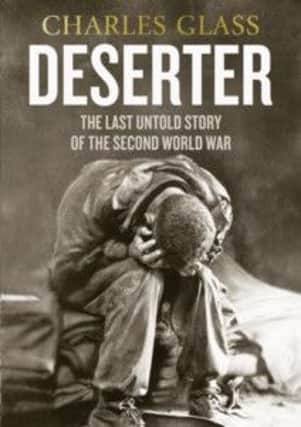Book review: Deserter: The Last Untold Story of the Second World War by Charles Glass


Slovik, a 25-year-old infantryman and ex-con from Detroit, was sentenced to ‘death by musketry’ for desertion during the infamous Battle of the Bulge which raged across northern France at the end of 1944. The US Army was fighting a bloody, violent battle for survival, and the counter-offensive resulted in 89,000 casualties, including 19,000 killed. Every man was vital to the campaign.
Before he was executed, Slovik wryly declared: ‘They’re not shooting me for deserting the United States Army, thousands of guys have done that. They just need to make an example out of somebody and I’m it because I’m an ex-con... they’re shooting me for the bread and chewing gum I stole when I was 12 years old.’
Advertisement
Hide AdAdvertisement
Hide AdSo what made these thousands of deserters decide to run, where did they go when there was no real place to hide and what happened to them when the war finally ended?
Veteran reporter and broadcaster Charles Glass goes where few men have dared to venture as he explores desertion from the Second World War battlefield, a long-held military taboo and a subject of the utmost sensitivity.
Deserter, a moving and gripping account of troops under unimaginable pressure, follows a group of British and American deserters into the heat of battle and examines the background of these men and what motivated them to take their fateful decision to run away.
The overwhelming majority of deserters were front-line infantry troops and without them, the war was harder to win. Many of these men were captured and court marshalled, while others were never apprehended. Some remain wanted to this day.
Advertisement
Hide AdAdvertisement
Hide AdBut, as Glass points out, few deserters were cowards. Many broke under the strain of constant battle, having faced the enemy without let-up for months at a time. Owing to the Allies’ ‘flawed’ system of replacing troops at the front, he says, men were often pushed beyond their limit.
Poor leadership for under-trained junior officers, many of whom reportedly stayed back from combat, left young soldiers without inspiration to endure daily artillery barrages along often static frontlines. And some soldiers deserted when all the other members of their units had been killed and their own deaths appeared inevitable.
At the heart of Glass’s powerful and emotional story are three remarkable soldiers who took their chances by deserting. The first is American Private Steve Weiss who applied to work in the Psychological Warfare Branch but was instead given a combat intelligence role which saw him facing perilous frontline work.
He got stranded behind German lines in southern France and ended up fighting with the French Resistance. He later fled his unit after a night of intense bombardment which, he told a military tribunal, had made him ‘break down inside.’
Advertisement
Hide AdAdvertisement
Hide AdThe only Briton followed here is schoolboy boxer John Bain, better known as a war poet under the nom-de-plume Vernon Scannell. Bain came from a working class family in Aylesbury, Buckinghamshire, and detested military life. He deserted from the Gordon Highlanders after exemplary service in North Africa and Normandy to escape the sight of his comrades looting dead bodies on the battlefield.
Glass’s last subject is an altogether different case study. Alfred T.Whitehead, a Tennessee farm boy who endured months of tough and relentless fighting in France, simply walked away from sentry duty one day. He joined a group of criminals and thrived as a gangster in post-liberation Paris. He was just one of many Allied deserters who ran the black market economies of Naples, Rome and Paris from 1944 to 1946.
Deserter is a compelling and thought-provoking book, examining with compassion and deep understanding the limits of human endurance in a war that killed 50 million people and devalued the moral basis of Europe’s civilisation.
As Glass observes with such disarming honesty: ‘The astounding fact is not that so many men deserted but that the deserters were so few.’
(HarperPress, hardback, £25)